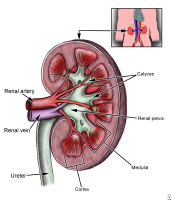 Kidney and surrounding anatomy
Kidney and surrounding anatomyChronic renal failure is the deterioration of kidney function,which progress over a prolonged period towards a fatal termination.The normal kidney function includes regulation of body fluids,electrolytes,pH and excretion of non - volatile metabolites.Urea,a toxic by product of metabolism gets accumulated in the body during renal failure. This occurs when 90% of functioning of renal tissue is destroyed.
Causes
1) Chronic interstitial nephritis.
2) Chronic infection of the urinary tract like chronic pyelonephritis.
3) Immunological disorders like glomerulonephritis.
4) Obstruction to urinary tract like kidney stones,urethral valves etc.
5) High blood pressure.
6) Other condition like diabetes mellitus , gout etc.
Dietary Management
Our motto is to encourage patient to take appropriate amount of fluid and electrolyte and adjust his or her to prevent accumulation of toxic waste product to the minimum possible level.
Fluid: A large fluid intake and high urine flow ensure a maximal rate of urea excretion.Generally no water restriction is required,in fact they should be encouraged to have fluid.But in patient with cardiac failure or in later stages when urine out put is reduced for the reason other than dehydration fluid to be restricted.
Energy: Carbohydrates should be the main source of calories and ingested simultaneously with the protein so that the protein will not be utilize for energy. For adults caloric needs range from 35-50 kcal per/kg of ideal body weight.Where as for children 80-110 kcal / kg and for infants it is 100-120 kcal / kg.
Protein: Severe restriction of protein is not required protein intake can be reduced to 0.5gm/kg body weight per day mainly from egg-white,rice or potato. With haemodialysis the protein intake should be increased to 1 gm /kg /day.But those on peritoneal dialysis more protein lost and they require daily 1.2 to 1.5gm protein per kg body weight per day. Canned and preserved meat should be avoided. Cheese,butter,which contains salt also,should be avoided.
Sodium: Dietary sodium intake depends upon amount of serum and urine. Both the excess and deficiency of sodium is dangerous.Sodium restriction may be needed because of odema, hypertension and threat of heart failure.Non dialysed patients,who are hypertensive,may be permitted less than 1gm sodium.But patients on haemodialysis are usually permitted intakes of 1.5 to 2.0 gm where as those on peritoneal dialysis are to receive 2 to 3 gm.The sodium allowance in children is 50 mg per kilogram per day.
Potassium: Daily potassium to be restricted to 1 mmol/kg of body weight. excess or deficiency of potassium is determined to the patient. In chronic renal failure hyperkalemia(increase potassium) is the rule. Foods high in animal protein are usually high in potassium and fruits and vegetables should be limited or excluded from the diet.The vegetables should be sliced and rinsed in running water and boiled with excess water and drain the water to reduce the potassium content of cooked vegetables.
Points to be noted:
- The food should be high in calories and low in protein.
- High protein sources like fish,chicken,meat and pulses should be taken in smaller quantities.
- Avoid canned,baked,processed and preserved foods.
- Salted cheese,butter and nuts should be avoided.
- To reduce potassium content cook the vegetables with more water and drain off excess.
- Avoid fruits,fruit juice and coconut water.
- If potassium is restricted avoid tea,coffee,bajra,maize,wheat flour,pulses and legumes,chocolates,fruits,sauces,jam and jellies.